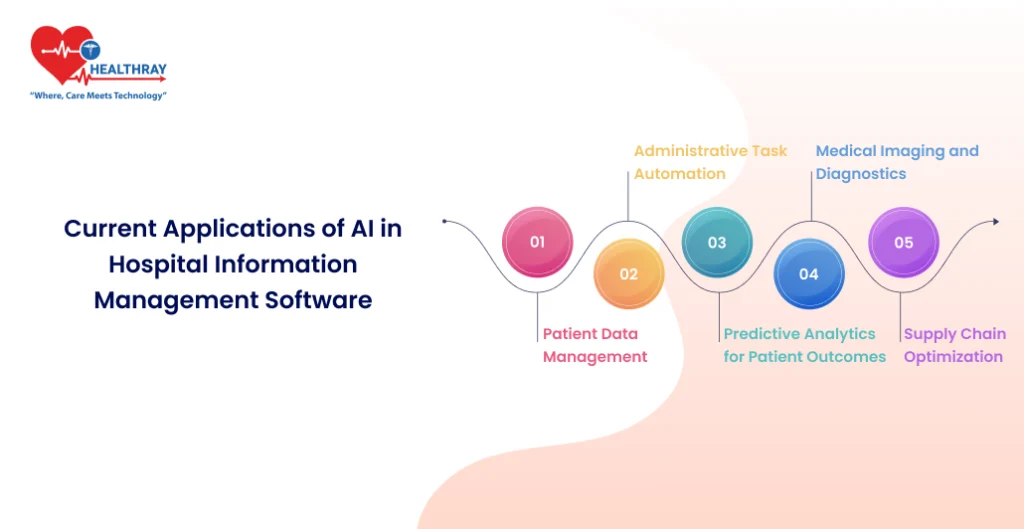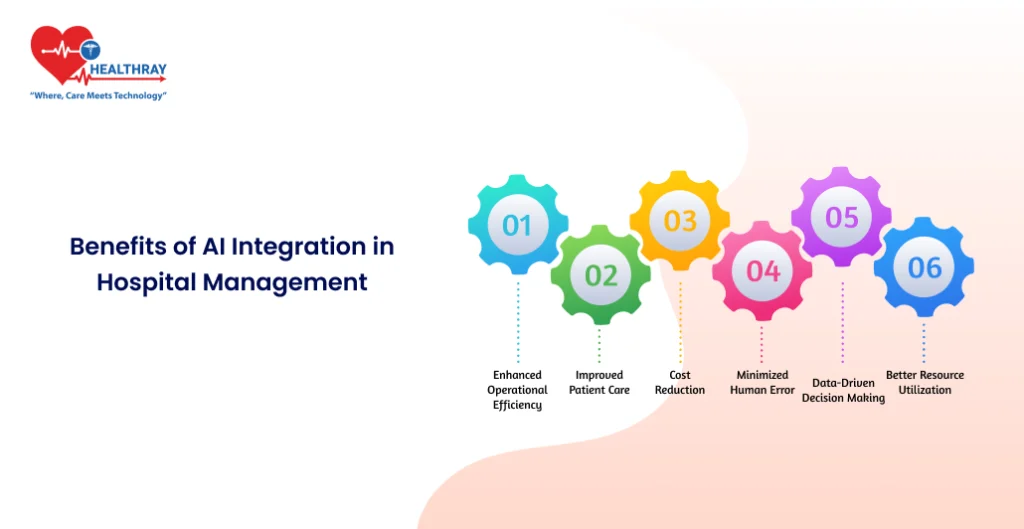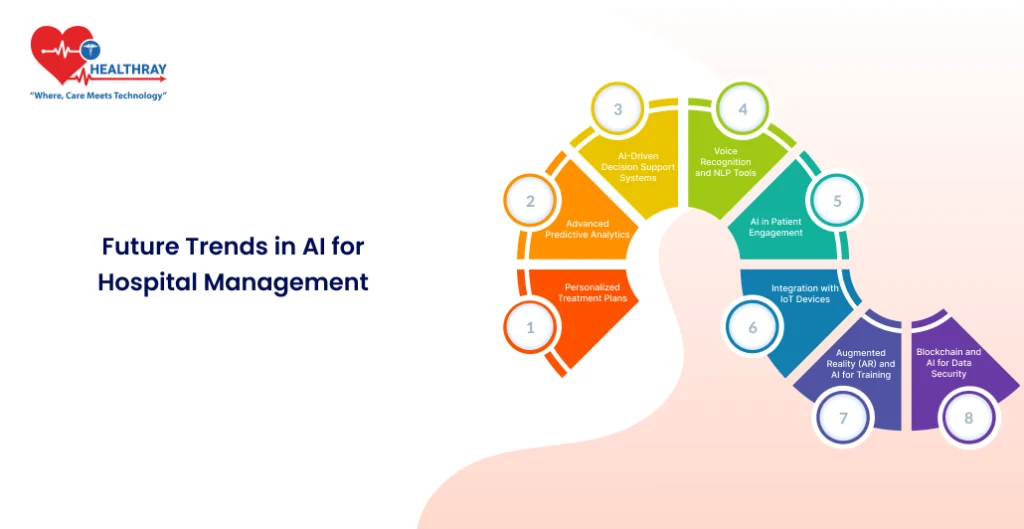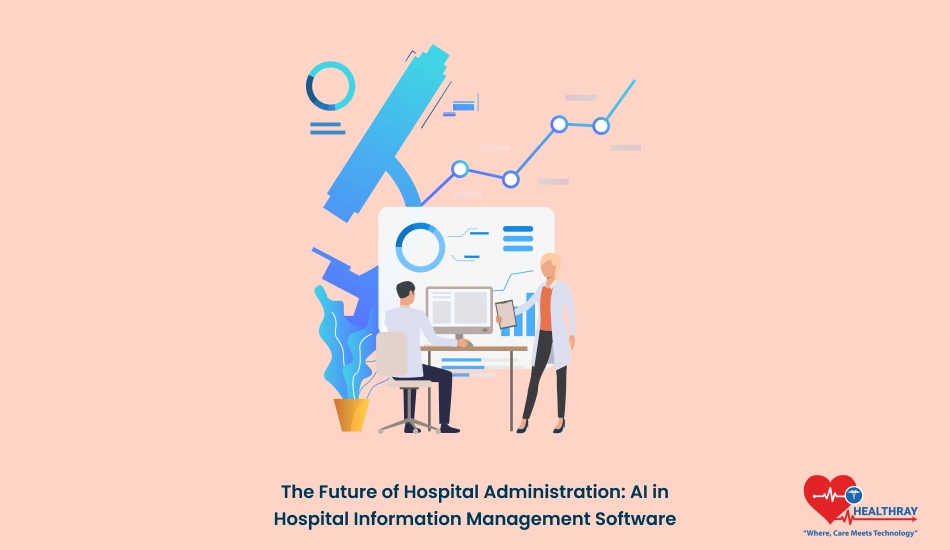AI is becoming a game-changer in hospital administration, reshaping the way information is managed and decisions are made. Hospital Information Management Software (HIMS), powered by AI, is turning into a core component of efficient healthcare systems. The shift isn’t just about technology; it’s about transforming patient care, streamlining operations, and reducing human errors.
But how is this actually happening? What areas are benefiting the most, and what should hospital administrators, healthcare IT professionals, and tech vendors expect in the coming years?
This post dives deep into the practical applications of AI in the Hospital Information Management System, its benefits, challenges, and where the future is heading. By the end, you’ll know not only how AI can revolutionize hospital administration but also the steps you can take to stay ahead in this fast-evolving domain.
Current Applications of AI in Hospital Information Management Software

AI is already making significant waves in hospital management by automating processes, reducing workload, and enhancing patient care. Here’s how it’s being applied in real-world settings:
Patient Data Management
Managing patient records system manually can be time-consuming and prone to errors. AI simplifies this by automating data entry, organizing records, and enabling quick access to information. Machine learning algorithms can identify patterns in patient history, helping healthcare providers predict and address medical conditions early.
Administrative Task Automation
AI-powered tools are transforming tedious administrative tasks such as appointment scheduling, staff management, and billing. Virtual assistants and chatbots are handling routine queries, freeing up staff to focus on critical activities. This improves efficiency and reduces the chances of administrative bottlenecks.
Predictive Analytics for Patient Outcomes
AI models analyze vast amounts of data to predict patient outcomes. For example, algorithms can forecast recovery times, readmission risks, and the likelihood of complications based on patient history. Hospitals use this to allocate resources effectively and personalize care for better outcomes.
Medical Imaging and Diagnostics
Although it overlaps with clinical applications, AI-driven diagnostics are increasingly integrated into HIMS. Tools that analyze medical images like X-rays and MRIs can flag potential health issues, offering support to radiologists and reducing diagnostic errors.
Supply Chain Optimization
AI helps hospitals manage their inventory and supply chains more effectively. From ensuring the availability of critical equipment to minimizing waste, AI-driven systems provide insights that optimize stock levels and procurement processes.
Benefits of AI Integration in Hospital Management

The integration of AI into hospital administration is delivering tangible benefits that improve efficiency, reduce costs, and enhance patient outcomes. Here are the key advantages that AI brings to the table:
Enhanced Operational Efficiency
AI handles repetitive and time-consuming tasks with ease, allowing staff to focus on more critical responsibilities. By automating processes like appointment scheduling, patient intake, and data processing, hospitals can minimize delays and streamline operations.
Improved Patient Care
AI tools help healthcare providers make informed decisions by analyzing patient data, predicting risks, and suggesting treatment plans. Personalized care becomes achievable as AI tailors medical recommendations to individual patient profiles. Similarly, intelligent solutions like an image to excel converter streamline data entry by instantly extracting structured information from scanned documents, receipts, or reports. This proactive approach leads to better patient outcomes.
Cost Reduction
AI-driven systems reduce administrative burdens and eliminate inefficiencies, saving money in the long run. For instance, predictive maintenance for medical equipment prevents costly downtime, and efficient resource allocation minimizes unnecessary expenses.
Minimized Human Error
Mistakes in healthcare can have serious consequences. AI mitigates this by offering consistent accuracy in tasks like data entry, diagnostics, and medication management. Decision-support systems provide evidence-based recommendations, reducing the risk of oversight.
Data-Driven Decision Making
Hospitals generate vast amounts of data daily. AI transforms this information into actionable insights, helping administrators make strategic decisions. Predictive analytics aids in planning for patient surges, optimizing staffing levels, and preparing for emergencies.
Better Resource Utilization
AI ensures that hospitals allocate their resources—be it staff, equipment, or medications—where they are needed most. This improves efficiency, reduces waste, and ensures better preparedness for patient care.
Challenges and Risks of AI in Hospital Management
While AI holds immense promise for hospital administration, integrating it into the Hospital Management Information Software comes with its own set of challenges. Addressing these concerns is critical for ensuring successful implementation and sustained benefits.
Data Security and Patient Privacy
Hospitals handle sensitive patient data, making them a prime target for cyberattacks. AI systems, which rely on vast amounts of data, amplify the need for stringent security measures. Ensuring compliance with regulations like HIPAA or GDPR is essential to protect patient privacy and avoid legal repercussions.
Implementation Costs
Adopting AI solutions requires significant investment in technology, infrastructure, and training. Smaller healthcare facilities may find it difficult to justify these expenses upfront, even though the long-term savings can offset initial costs. Budget constraints often slow down adoption rates.
Resistance to Change
Introducing AI can lead to resistance from staff who may fear losing their jobs or struggle to adapt to new technologies. Gaining employee buy-in requires effective communication about the role of AI as a tool to augment, not replace, human expertise.
Data Quality and Integration
AI is only as effective as the data it processes. Hospitals often face challenges with fragmented or inconsistent data, which can hinder AI’s performance. Integrating AI systems with existing hospital information management platforms also requires careful planning and technical expertise.
Ethical Concerns
Using AI in healthcare raises ethical questions, especially when it comes to decision-making. For instance, who is responsible if an AI-driven recommendation leads to a negative outcome? Hospitals must establish clear protocols to address accountability.
Skills Gap
AI implementation demands skilled professionals who understand both healthcare and advanced technologies. Hospitals often need to invest in training or hire external experts, which adds to the cost and complexity of integration.
Future Trends in AI for Hospital Management

AI in hospital administration is evolving rapidly, offering exciting possibilities for transforming healthcare systems. Here are some of the key trends shaping the future of hospital information management software:
Personalized Treatment Plans
AI is making it possible to customize care for each patient based on their unique medical history, genetic data, and lifestyle factors. Algorithms analyze these inputs to recommend tailored treatment protocols, improving patient outcomes and satisfaction.
Advanced Predictive Analytics
Hospitals are leveraging predictive models to anticipate patient needs and improve resource allocation. For example, AI can forecast patient admission trends, enabling hospitals to optimize staffing, bed availability, and inventory management in advance.
AI-Driven Decision Support Systems
AI tools are increasingly assisting Hospital Care providers in clinical decision-making. These systems analyze medical records, latest research, and real-time data to offer evidence-based suggestions. This helps reduce errors and ensures more accurate diagnoses and treatment plans.
Voice Recognition and NLP Tools
Natural language processing (NLP) is being integrated into hospital management systems to streamline administrative tasks. Voice recognition tools allow doctors to dictate notes, which are automatically transcribed and updated in patient records, saving time and improving documentation accuracy.
AI in Patient Engagement
Chatbots and virtual assistants are becoming key tools for enhancing patient engagement. They answer common queries, schedule appointments, and provide reminders for medications or follow-ups, ensuring patients stay connected with their care plans.
Integration with IoT Devices
The Internet of Things (IoT) is playing a critical role in healthcare by connecting medical devices and sensors. AI processes this data in real time, enabling remote monitoring of patients and timely interventions. This trend is especially impactful for chronic disease management.
Augmented Reality (AR) and AI for Training
Combining AI with AR is enhancing medical training and simulation exercises. Hospital administrators are exploring this technology for staff training, helping employees better understand new AI-driven systems and tools.
Blockchain and AI for Data Security
AI and blockchain are being integrated to strengthen data security in hospital information systems. Blockchain ensures transparency and immutability, while AI monitors and predicts potential security threats.
Conclusion
The integration of AI in hospital information management systems is no longer a futuristic idea—it’s a practical reality transforming the way hospitals operate. From automating administrative tasks to personalizing patient care and optimizing resources, AI is reshaping hospital administration for the better.
While challenges such as data security, implementation costs, and staff resistance exist, they are hurdles that can be overcome with strategic planning and a focus on ethical AI practices. The benefits, including enhanced operational efficiency, improved patient outcomes, and significant cost savings, make the journey worthwhile.
Hospital administrators, healthcare IT professionals, and tech vendors have an incredible opportunity to lead this change. By staying informed about current applications, addressing potential risks, and preparing for future trends, they can unlock the full potential of AI in healthcare.
Now is the time to act—explore the possibilities, start small with pilot programs, and scale solutions as you gain confidence. The future of hospital administration is here, and AI is at its core.





